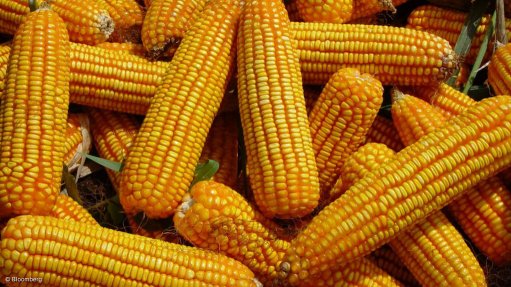
South Africa is expected to have a bumper maize crop this year
Photo by: Bloomberg
South Africans should not be concerned about the availability of food during the current Covid-19 pandemic. This assurance has been given by the Bureau for Food and Agricultural Policy (BFAP), a Pretoria/Tshwane-based nonprofit organisation (created in 2004 to carry out scientifically rigorous and unbiased research relevant to the agricultural sector).
“Empty food shelves in parts of the country reflect panicky consumer stockpiling and not disrupted food supply chains,” it stated in its new report, Impact of Covid-19: South Africa has sufficient food supplies. “Overall, South Africa is a surplus producer of food and the value of South Africa’s food exports exceeds imports by a significant margin.”
South Africa’s major food and agricultural imports were (from most to least valuable, in rand terms) rice, poultry, wheat and meslin (a mixture of wheat and rye), sugar, palm oil, undenatured ethyl alcohol, leather products, food preparations (not elsewhere specified), beer, soybean oilcake, animal feed preparations, sunflower oil and live cattle. BFAP assured that the world market was well-supplied with all food items.
“[A]ny potential periodic shortfalls will mainly arise due to logistical disruptions caused by lock downs and restrictions on the movement of goods,” said BFAP. “This would only be the case for the specific food items that are typically imported from affected regions in the world market.”
In terms of individual countries, the main sources of South African food and agricultural imports were China, Thailand, Brazil, Eswatini and Argentina. However, the products supplied by China were mainly leather products, animal by-products and textiles – of limited concern, regarding food supplies. Thailand provided rice, Brazil mainly supplied poultry meat, Eswatini sugar and Argentina soybean oilcake (for animal feed).
As a bloc, however, the biggest source of South African food and agricultural imports was the European Union (EU). And Europe was now the centre of the Covid-19 outbreak. South Africa’s main food and agricultural import from the EU was wheat, followed by undenatured ethyl alcohol, sunflower oil, food preparations and poultry meat.
There were, however, alternative sources of wheat, such as the US. And South Africa’s 2020 maize crop was expected to be the second largest ever recorded, at a forecast 15.5-million tons (9.1-million tons of white maize). Each year, South Africans consume some 5.4-million tons and their animals another 5.8-million tons, meaning there would be a significant surplus this year, allowing exports to neighbouring countries.
Thailand, which had not yet suffered as severely from Covid-19 as China or Europe, was South Africa’s main source for rice. “Even in a scenario where global supply chains disrupt the consistency of rice and wheat imports over the medium term, S[outh] A[frica] will have sufficient staple white maize to accommodate a relative shift out of rice and wheat to maize,” concluded the BFAP.